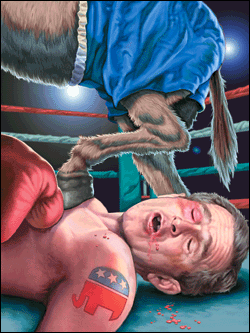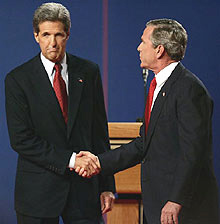SUBJECT: PRESIDENTIAL ELECTION 2004
SOURCE: JUAN WILSON juanwilson@mac.com
POSTED: 14 October 2004 - 10:00am
Early poll gives Kerry the edge in final debate
Edited by Andrea Botha for www.news24.com 14 October 2004 Bush
is 'like Tony Soprano' |
http://www.cnn.com
14 October 2004 |
SUBJECT: PRESIDENTIAL ELECTION 2004
Second Debate Won by Kerry
SOURCE: JUAN WILSON
juanwilson@mac.com 9 October 2004 - 9:00am

Kerry &
Bush leaning to hear quesion from audience
“My
opponent said that America must pass a global test before
we used force to protect ourselves. That's the kind of mindset
that says sanctions were working.” George
Bush Faced
with September job numbers that were lower than expected,
lower than needed to keep up with population growth and
way, way lower than his own Council of Economic Advisors
projected just last year, Bush could say only that the country
would be better off if the Senate cracked down on trial
lawyers and passed Dick Cheney's energy bill. The economy
is "growing," Bush said, and "freedom is
on the march." ... |
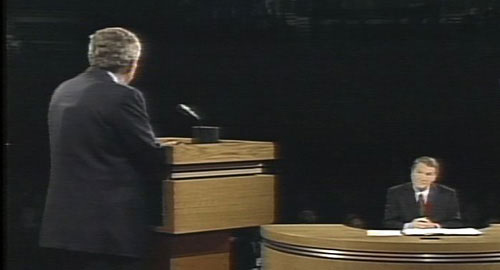
Bush's
mystery bulge: Part 1 by
Dave Lindorff for Salon.com published 8 October 2004 |
Bush's
mystery bulge: Part 2 by
Dave Lindorff for Salon.com published 9 October 2004 |
SUBJECT: PRESIDENTIAL ELECTION 2004
First Debate Won by Kerry
SOURCE: JUAN WILSON
juanwilson@mac.com 1 October 2004 - 4:30am

Kerry & Bush during
the fray
"Invading Iraq was a colossal error in judgement" - Kerry "Of course we're after Saddam Hussein - I mean bin Laden" - Bush It was gratifying to see Kerry win the debate on Iraq in both style and substance. We watched CNN and were delighted to see that CNN defied the constraints of the understanding of memorandum and used a split screen too show the reactions of the candidates to one another throughout the 90 minute debate. Reaction shots showed Kerry taking notes and thinking while Bush spoke. While Kerry spoke the reaction of Bush was bizarre. Sometimes Bush looked annoyed or frightened. Sometimes he looked confused. We watched a replay of the debate on PBS. They showed no split screen and showed no reaction shots and the debate did not seem as lopsided in Kerry's favor. Bush's handlers will be all over this issue. Their man looked weak while not parrotting a mantra containing the words "mixed message", "strong leader", "perfectly clear". The question now is how this will play in the crucial swing states. But it is no mixed message" to say it is "perfectly clear" Kerry is back in this race. And if the spinmasters don't distort reality beyond recognitionl, Kerry should be ahead in the polls after the next debate a week from now. |
SUBJECT: PRESIDENTIAL ELECTION 2004
Coming into the homestretch
SOURCE: JUAN WILSON
juanwilson@mac.com 30 September 2004 - 7:30am

preparations at the
podium for first 2004 debate
The debate between Bush and Kerry will begin in a few hours (3pm Hawaii time and rebroadcast at 9pm). The impact and the interpretation in the aftermath will likely decide who will be elected president in November. This first debate will be the one most widely anticipated and watched. It will be the one focused on the War with Iraq and will solidify the mindset of journalists and pundits about the conventional wisdom that leads us to November. The winner in November will be the most powerful man in the world and will set the agenda for our future. This will have a great impact on Kauai. Whether Kauai continues evolving into another suburb of Los Angeles serving first the needs of the aero-spatial, communications and military interest of the United States or can retain some semblance of a quiet tropical paradise living in balance with nature will be decided. But it won't be decided here. Hawaii will certainly give it's four electoral votes to John Kerry. It is the people in the swing states (with 100 electoral votes) who will determine our fate. Those states are:
|
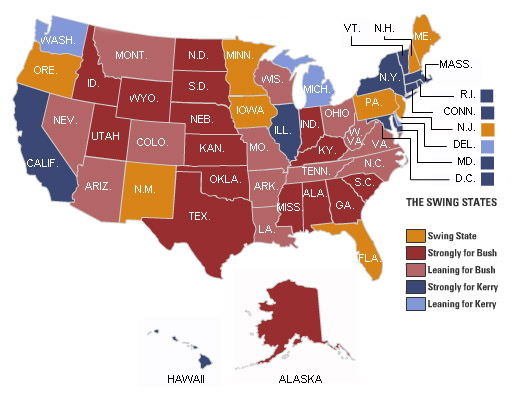
There are 270 electoral votes needed to win the presidency. According to the New York Times George Bush has 257 leaning or strongly in his camp. Kerry has 181. If this is true, then with either Pennsylvania or Florida going for Bush, it is all over. Looking at the map above it is clear that less populated "heartland" (or as the Germans called it "fatherland") are lined up for Bush. A solid swath, north to south, from North Dakota to Texas all Bush country. An intersecting solid swath, from east to west, from South Carolina to Idaho is also solidly for Bush. Only a fringe of populated states in the northeast, midwest and westcoast are lined up on Kerry's side. This is a bit depressing. The situation is only slightly alleviated by looking at the same map biased for electoral college votes. |
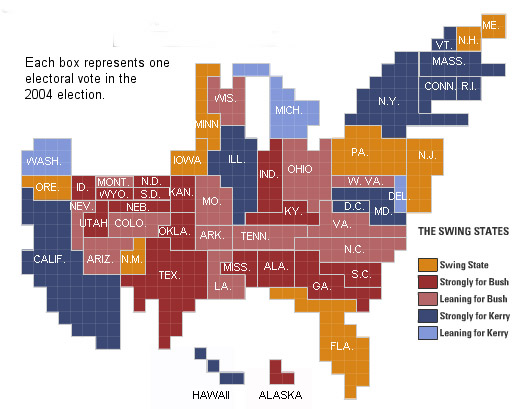
Unfortunately, there are many combinations of situations that will bring Bush the presidency. We can only hope that the news media is missing a crucial aspect of the electorate's mood, or that the debate tonight will alter the landscape. I suspect we'll be surprised. I hope we'll be delighted as well. |
Pau
